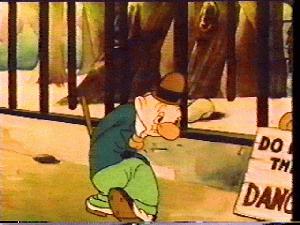Media for Kids

One great thing about kids — especially kids who have not been overexposed to TV media — is how easily entertained they are. We recently showed Esther some Looney Tunes cartoons from the 1940’s (on a real TV, no less!) and she couldn’t stop laughing. It is refreshing to see someone spellbound by animated content that didn’t require a rendering farm to create. I’m sure she’ll be jaded soon enough, but we’re trying to drag it out as long as possible by providing only very occasional small doses.
This piece on the end of reading as a cultural activity is chock full of interesting statistics. This excerpt, in particular, is relevant here:
In August, scientists at the University of Washington revealed that babies aged between eight and sixteen months know on average six to eight fewer words for every hour of baby DVDs and videos they watch daily. A 2005 study in Northern California found that a television in the bedroom lowered the standardized-test scores of third graders. And the conflict continues throughout a child’s development. In 2001, after analyzing data on more than a million students around the world, the researcher Micha Razel found “little room for doubt†that television worsened performance in reading, science, and math. The relationship wasn’t a straight line but “an inverted check markâ€: a small amount of television seemed to benefit children; more hurt. For nine-year-olds, the optimum was two hours a day; for seventeen-year-olds, half an hour. Razel guessed that the younger children were watching educational shows, and, indeed, researchers have shown that a five-year-old boy who watches “Sesame Street†is likely to have higher grades even in high school. Razel noted, however, that fifty-five per cent of students were exceeding their optimal viewing time by three hours a day, thereby lowering their academic achievement by roughly one grade level.
It certainly doesn’t surprise me that television–even educational TV–is generally not good for kids. The “inverted check mark” bit was a surprise, though. Who would guess that two hours a day is optimal for the nine-year-old brain?
On a related note, Kiddie Records Weekly (recommended by about.com here) is an astonishingly extensive source of free children’s books in MP3 format. It’s also an excellent example of the increasing relevance of bittorent in enabling wide economical distribution of legitimate content. The content is primarily (exclusively?) digitized vinyl records from the 1930’s and 1940’s. Fortunately, Alice in Wonderland gets no worse with age.
To complete the nostalgia circuit, who can forget “loaf of bread, a container of milk, and a stick of butter” (via sketchelement, quite a while ago):
[youtube]http://www.youtube.com/watch?v=HuESO65nPXY[/youtube]
These are good times to be a kid. Or maybe just to be a parent.
[Tags]Looney Tunes, Alice in Wonderland, Reading, TV, Cartoons, Sesame Street, Bittorrent[/Tags]


 Success as a parent is when your two year old recognizes and demands, at various times, Joni Mitchell, Paul McCartney (particular tracks), They Might Be Giants, and the White Stripes. And when she knows how to operate her own portable CD player and navigate your cell phone photo library.
Success as a parent is when your two year old recognizes and demands, at various times, Joni Mitchell, Paul McCartney (particular tracks), They Might Be Giants, and the White Stripes. And when she knows how to operate her own portable CD player and navigate your cell phone photo library.